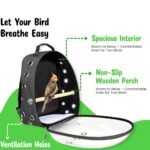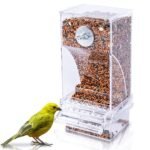Road Trip With Your Bird Pet: Complete Guide to Safe and Stress Free Bird Travel
Taking a road trip with your bird pet can be one of the most memorable experiences for any bird parent. Birds are intelligent, curious, and affectionate companions. When given the right environment, they can enjoy car journeys just as much as humans. However, unlike dogs or cats, birds have very specific needs when traveling. They are sensitive to temperature changes, unfamiliar sounds, and sudden movements.
Whether you’re planning a long drive with your parrot, cockatiel, budgie, or any other bird in India or abroad, preparation is the key to a safe and enjoyable journey. This guide covers everything you need—from choosing the right travel cage and feeding essentials to first aid tips and travel checklists—so your feathered friend stays comfortable on the road.
Why Planning a Road Trip With Your Bird Pet Matters
Many first-time bird parents assume that traveling with birds is as simple as putting them in a cage and starting the car. Unfortunately, this can be dangerous. Birds can panic from loud noises, suffer heat strokes in hot weather, or even injure themselves in an unstable cage.
In India, where highways are often crowded and journeys can be unpredictable due to traffic or weather conditions, proper planning becomes even more important. A well-prepared road trip ensures:
✅ Safety: Prevents injuries, panic, or escape.
✅ Comfort: Keeps your bird calm and well-rested.
✅ Health: Prevents overheating and dehydration.
✅ Bonding: Turns travel into a shared adventure.
👉 Pro Tip: Birds mirror your emotions. Stay calm, and they’ll relax too.
11 Must-Have Essentials for a Road Trip With Your Bird Pet
Let’s go step by step through everything you’ll need for a smooth road trip with your bird pet.
1. Sturdy Bird Travel Cage for Road Trips
The travel cage is your bird’s home on wheels. It must be safe, stable, and comfortable. The size should be compact enough to prevent your bird from being thrown around on bumps, but spacious enough for turning around and stretching.
A good bird travel cage should have:
- Ventilation: Mesh panels or windows to ensure proper airflow.
- Perches: Textured or wooden perches for grip. Avoid slippery plastic.
- Security: Lockable, escape-proof doors for safety at rest stops.
- Stability: Removable base with a tray for easy cleaning.
- Comfort: Just enough space to avoid tossing but not too large.
💡 Pro Tip: Place the travel cage on the car seat with a seatbelt securing it. This prevents sliding or tipping during sharp turns.
2. Familiar Perch for Comfort
Birds thrive on familiarity. Introducing a perch from their home cage inside the travel cage can greatly reduce anxiety. This gives your bird a sense of comfort and stability during the journey.
- Add a perch your bird already uses.
- Fix it securely at a low level to prevent falls during sudden stops.
- Avoid introducing new perches during travel—it may confuse or stress your bird.
3. Cage Cover or Light Cotton Sheet
Birds can get overstimulated by continuous roadside motion, honking, and sunlight. Covering the cage with a light cotton cloth reduces visual stress and keeps your bird calm.
- Calms birds and minimizes panic during noisy drives.
- Provides shade from harsh sunlight.
- Allows airflow while blocking distractions.
- Cotton or breathable fabric works best in hot Indian weather.
💡 Pro Tip: Keep the cover half-open during cooler hours so your bird can enjoy the journey without being overstimulated.
4. Spill-Proof Water Bowls & Feeders
Hydration is critical during long drives, especially on Indian highways in summer. Standard bowls spill easily with car movements, so invest in spill-proof feeders.
- Attach spill-proof or deep cups low inside the cage.
- Keep them secure to prevent tipping.
- For shorter trips, offer cucumber or apple slices for hydration.
💡 Hydration Tip: Never give your bird extremely cold water during travel—it can cause digestive stress. Room temperature water is best.
5. Bird Food for Road Trips
Always carry extra food supplies when traveling with birds. In India, road delays due to traffic or weather are common. Running out of bird food can be stressful for both you and your pet.
- Pack more seed mix or pellets than usual.
- Avoid offering new foods during travel. Birds may reject them.
- Skip watery or soft foods that may cause digestive issues.
💡 Pro Tip: Pre-pack small food portions in zip-lock bags to make feeding easy and mess-free on the road.
6. Cuttlebone or Mineral Block
Birds often get restless or bored on long journeys. A cuttlebone or mineral block not only provides entertainment but also supports beak health.
- Keeps beaks busy and reduces stress.
- Offers reassurance during unfamiliar surroundings.
- Prevents destructive chewing behavior.
7. Favorite Bird Toy
Carrying a favorite toy is a great way to keep your bird entertained. Familiar toys provide mental comfort and reduce travel anxiety.
- Pick lightweight, familiar toys.
- Ensure they don’t swing excessively inside the cage.
- Avoid toys with loose parts that may become choking hazards.
8. Bird First Aid Kit for Emergencies
Emergencies can happen anytime. A small bird first aid kit is essential for managing minor injuries or stress.
Include:
- Antiseptic powder (vet-approved, like Neosporin).
- Cotton balls and bandages.
- Saline drops for eyes.
- Bird-safe antiseptic cream (e.g., calendula).
⚠️ Important: Never use human medicines without consulting an avian vet—they can be toxic for birds.
9. Wet Wipes & Paper Towels
Birds are messy eaters, and travel often adds to the chaos. Keeping wet wipes and paper towels handy ensures cleanliness.
- Wipe food spills or droppings quickly.
- Clean perches and cage surfaces on the go.
- Maintain hygiene during long drives.
10. Travel Documents (if required)
If you’re traveling across state borders or abroad, you may need travel documents for your bird. Some hotels also require proof of ownership or vaccination.
- Carry health certificates and proof of ownership.
- Keep copies of vaccination records (if applicable).
- Check state and airline rules in advance.
💡 Pro Tip: Always store a digital copy of documents on your phone in case you misplace the originals. Also, call your destination ahead to check if they’re bird-friendly.
11. Final Bird Travel Checklist Before You Leave
Before heading out, do a quick run-through of your bird travel essentials. Forgetting even a small item can cause stress later.
| Essentials | Checked |
|---|---|
| Travel cage (ventilated & secure) | ✅ |
| Familiar perch & toy | ✅ |
| Food, water, & cuttlebone | ✅ |
| Cage cover or cotton cloth | ✅ |
| First aid kit & wipes | ✅ |
| Documents (if required) | ✅ |
Extra Safety Tips for Traveling With Birds in India
- Avoid peak afternoon heat. Birds are prone to overheating. Travel during mornings or evenings.
- Never leave your bird alone in the car. Even a few minutes can cause heat stroke.
- Keep noise levels low. Avoid loud music or honking near the cage.
- Take short practice drives. Let your bird adjust to the car’s motion before a long journey.
- Plan rest stops carefully. Avoid smoky or noisy places like roadside dhabas.
FAQs on Road Trip With Your Bird Pet
Q1. Can birds travel long distances by car?
Yes, birds can travel long distances if their needs are properly managed. Ensure the cage is secure, hydration is constant, and stress is minimized with familiar toys and perches.
Q2. Do birds get car sick?
Birds usually don’t get car sick like cats or dogs, but they can feel anxious or disoriented. Covering the cage and keeping it stable helps reduce stress.
Q3. How do I calm my bird during a road trip?
Bring a familiar perch, cover the cage partially, and maintain a moderate car temperature. Talking softly to your bird or playing gentle music can also help.
Q4. Is it safe to stop at roadside dhabas with my bird?
Yes, but exercise caution. Never leave your bird unattended, and keep the cage away from direct sunlight, smoke, or loud noises.
Q5. How long can birds stay in a travel cage?
Birds can manage several hours in a travel cage if it’s comfortable, well-ventilated, and equipped with food and water. For long journeys, schedule breaks to check on your bird.
Final Thoughts on Taking a Road Trip With Your Bird Pet
A road trip with your bird pet is more than just travel—it’s an adventure filled with bonding and new experiences. With the right travel cage, feeding essentials, and safety measures, your bird can enjoy the journey as much as you do.
Always plan ahead, prepare a travel checklist, and prioritize your bird’s safety. Whether it’s a short weekend getaway or a long cross-country drive, your bird deserves comfort and care on the road.
✨ Remember: A calm, hydrated, and secure bird equals a happy travel companion. With these tips, you’re all set to create wonderful memories with your feathered buddy on the open road.
✨ A calm, hydrated, and secure bird = a happy co-traveler.
So pack smart, stay patient, and enjoy the open road — together.
Where To Buy Bird Travel Cages?
- Reliable travel cages are available on online and offline stores.
- visit our shop at Shinfly.org/shop for options

Holiday Sale
Up to 60% off
Pick your favorite products for travelling with your pet bird from our shop especially curated for you!

- Rated 0 out of 5
- Rated 0 out of 5
- Rated 0 out of 5




